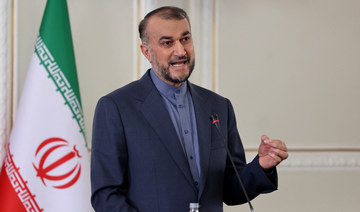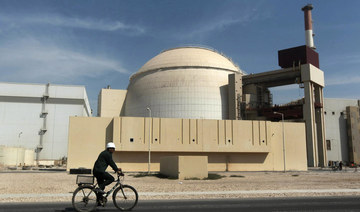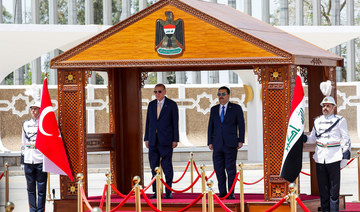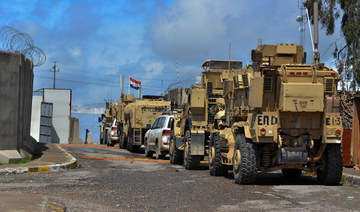VIENNA: Iran has agreed to supply answers long sought by the United Nations' nuclear watchdog, Tehran and the UN agency said Saturday, as talks in Vienna over its tattered atomic deal with world powers appear to be coming to an end.
A joint statement by Mohammad Eslami, the head of the civilian Atomic Energy Organization of Iran, and Rafael Mariano Grossi of the International Atomic Energy, came hours after the two met in Tehran.
It envisions the IAEA reaching conclusions on the discovery of uranium particles at former undeclared sites in Iran by June. The move is separate from the talks over the nuclear deal but could help push them to a conclusion.
But meanwhile, Russia's foreign minister for the first time linked US sanctions on Moscow over its war on Ukraine to the ongoing Iran nuclear deal talks — adding a new wrinkle to the delicate diplomacy.
Grossi said in Tehran that “it would be difficult to believe or to imagine that such an important return to such a comprehensive agreement ... would be possible if the agency and Iran would not be seeing eye to eye on how to resolve these important safeguards issues.” Safeguards refer to the IAEA's inspections and monitoring of a country's nuclear program.
Grossi for years has sought for Iran to answer questions about man-made uranium particles found at former undeclared nuclear sites. US intelligence agencies, Western nations and the IAEA have said Iran ran an organized nuclear weapons program until 2003. Iran long has denied ever seeking nuclear weapons.
Eslami said the men had reached an “agreement” that would see Iran “presenting documents that would remove the ambiguities about our country.” He did not elaborate on what the documents would discuss.
The later joint statement said that Eslami's agency will by March 20 give the UN nuclear watchdog “written explanations including related supporting documents to the questions raised by the IAEA which have not been addressed by Iran on the issues related to three locations.”
Within two weeks, the IAEA will review that information and submit any questions, and within a week of that the two agencies will meet in Tehran to address the questions.
Grossi will then aim to report his conclusions by the time the IAEA board of governors meets in June.
Speaking on his return to Vienna, Grossi said that “may or may not happen,” depending on Iran’s cooperation. He said the conclusions could go in “different directions” and could be final or partial.
“The safeguards issues will not be resolved politically because I will not go for that,” Grossi said.
“There is no artificial deadline, there is no predefined outcome, there is no predefined name for what I am going to do,” he told reporters.
The nuclear deal saw Iran agree to drastically limit its enrichment of uranium in exchange for the lifting of crushing economic sanctions. But a 2018 decision by then-President Donald Trump to unilaterally withdraw America from the agreement sparked years of tensions and attacks across the wider Mideast.
Today, Tehran enriches uranium up to 60% purity — its highest level ever and a short technical step from weapons-grade levels of 90% and far greater than the nuclear deal’s 3.67% cap. Its stockpile of enriched uranium also continues to grow, worrying nuclear nonproliferation experts that Iran could be closer to the threshold of having enough material for an atomic weapon if it chose to pursue one.
Undeclared sites played into the initial 2015 deal as well. That year the IAEA’s then-director-general went to Tehran and visited one suspected weapons-program site at Parchin. Inspectors also took samples there for analysis.
Grossi's inspectors also face challenges in monitoring Iran's current advances in its civilian program. Iran has held IAEA surveillance camera recordings since February 2021, not letting inspectors view them amid the nuclear negotiations.
In Vienna, negotiators appear to be signaling a deal is near, even as Russia's war in Ukraine rages on. Russian ambassador Mikhail Ulyanov has been a key mediator in the talks and tweeted Thursday that negotiations were “almost over.” That was also acknowledged by French negotiator Philippe Errera.
“We hope to come back quickly to conclude because we are very, very close to an agreement,” Errera wrote Friday on Twitter. “But nothing is agreed until EVERYTHING is agreed!”
But comments Saturday by Russian Foreign Minister Sergey Lavrov for the first time offered the suggestion that the Ukraine war — and the stinging sanctions that Americans and others have put on Moscow — could interfere.
“We need guarantees these sanctions will in no way affect the trading, economic and investment relations contained in the (deal) for the Iranian nuclear program," Lavrov said, according to the Tass news agency.
Lavrov said he wanted “guarantees at least at the level of the secretary of state” that the US sanctions would not affect Moscow's relationship with Tehran. There was no immediate American response to Lavrov's comments.
Meanwhile on Saturday, Iran's paramilitary Revolutionary Guard unveiled what it described as two new underground missile and drone bases in the country. State TV said the bases contained surface-to-surface missiles and armed drones capable of “hiding themselves from enemy radar.”
Iran to answer UN nuclear questions as deal talks near end
https://arab.news/2jkuq
Iran to answer UN nuclear questions as deal talks near end
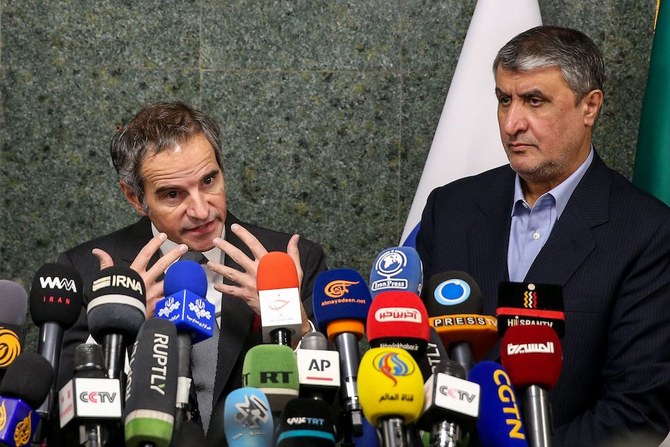
- Tehran wants issue of uranium traces found at several old but undeclared sites in Iran closed
Qatar Foreign Ministry: No justification to end Hamas’ presence in Doha
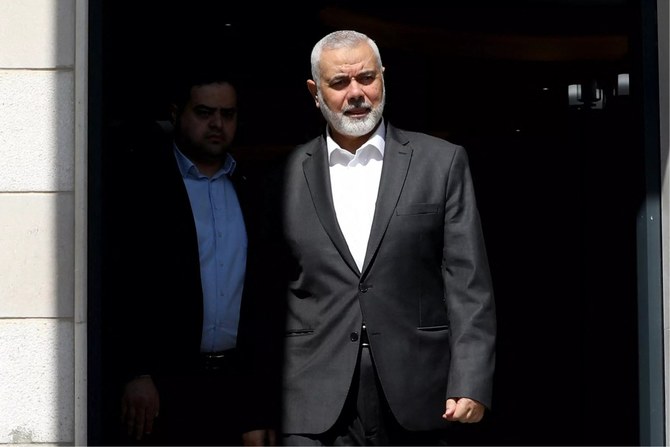
- Qatar said it was re-evaluating its role as mediator in ceasefire talks between Israel and the Palestinian group Hamas
DUBAI: Qatar said on Tuesday there was no justification to end the presence of an office for Palestinian militant group Hamas in Doha while its mediation efforts continued in the Gaza war.
Foreign Ministry spokesperson Majed Al-Ansari added in a press conference that Qatar remained committed to mediation but was reassessing its role in "frustration with attacks" on its efforts.
Last week, Qatar said it was re-evaluating its role as mediator in ceasefire talks between Israel and the Palestinian group Hamas, citing concerns that its efforts are being undermined by politicians seeking to score points.
Qatari Prime Minister Sheikh Mohammed bin Abdulrahman Al-Thani, who is also foreign minister, said there was a "misuse of this mediation for narrow political interests, and this necessitated Qatar to undertake a full evaluation of this role".
Turkiye’s Erdogan says Iraq sees need to eliminate Kurdish PKK militia
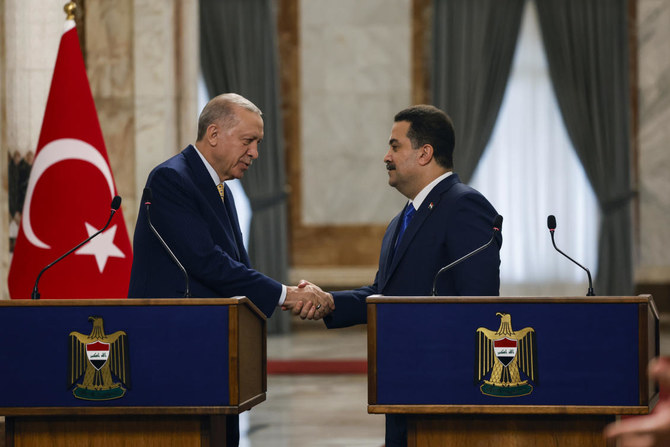
- Ties between the neighbors were entering a new phase after they agreed to cooperate against militants, boost economic ties
- Erdogan visited Iraq for the first time since 2011 following years of tensions as Ankara carried out cross-border attacks on PKK militants based in northern Iraq
ANKARA: Turkish President Tayyip Erdogan said in remarks published on Tuesday he believed Iraq saw the need to eliminate the Kurdish PKK militia and had the will to do so, adding Ankara wanted Baghdad’s support in that battle.
Erdogan was speaking after talks in Baghdad and Irbil on Monday, the first visit by a Turkish leader to Iraq since 2011, following years of tensions as Ankara carried out cross-border attacks on PKK militants based in northern Iraq.
Ties between the neighbors were entering a new phase, Erdogan said, after they agreed to cooperate against militants, boost economic ties via a new corridor and consider Iraq’s needs for access to scarce water.
Speaking to reporters on his flight back from Iraq, Erdogan said Turkiye’s battle with terrorism would continue in line with international law, and added he hoped to see concrete results of Baghdad labeling the PKK a “banned organization” last month.
The PKK, designated a terrorist group by Turkiye, the US and the European Union, took up arms against the Turkish state in 1984. More than 40,000 people have been killed in the insurgency.
The conflict was long fought mainly in rural areas of southeastern Turkiye but is now more focused on the mountains of northern Iraq’s mountainous, semi-autonomous Kurdistan region.
“One would hope that our neighbors put the necessary stance forward against the threats directed at us from their lands, and we continue this battle jointly,” Erdogan said, according to a text of the in-flight comments published by his office.
“Eliminating this threat is also to the benefit of Iraq. I believe they see this reality and they will now put forth a will for this issue to be removed,” he said, adding he also discussed steps against the PKK during talks in Irbil.
Asked about Iraq’s needs for access to water, Erdogan said Turkiye was not a country with abundant water resources and also had to manage its own needs. He added plans taking into account “changing climate conditions” were needed for the sustainable use of water.
“Therefore, we need to take cautious steps. With evaluations to be held in that direction, it may be possible to find common ground,” he said.
On Monday, the two countries agreed to a strategic framework agreement overseeing security, trade and energy as well as a 10-year deal on the management of water resources that would take Iraq’s needs into account.
Two Hezbollah members killed in Israeli strikes
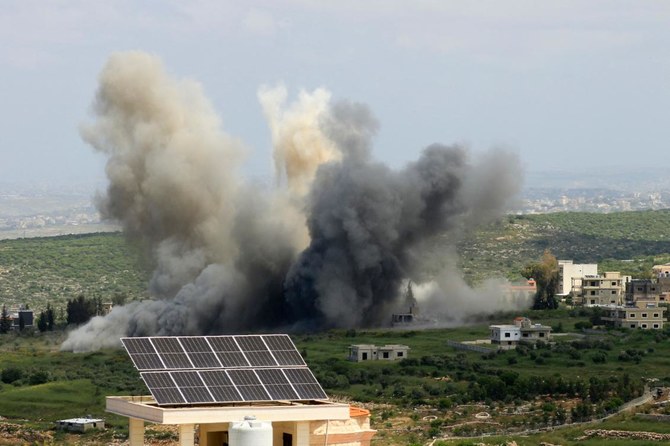
- The latest strike hit the Abu Al-Aswad area near the coastal city of Tyre
BEIRUT: Hezbollah announced two of its members had been killed by Israeli fire Tuesday, with the Israeli army saying it eliminated “two significant” members of the Iran-backed group in south Lebanon.
Since Hamas’s unprecedented October 7 attack on Israel triggered war in Gaza, there have been near-daily cross-border exchanges of fire between Hezbollah and the Israeli army.
But Hezbollah has stepped up its rocket attacks on Israeli targets in recent days.
On Tuesday morning, a source close to the group told AFP an Israeli drone strike deep into Lebanon killed an engineer working for Hezbollah’s air defense forces as he was traveling in a vehicle.
The strike hit the Abu Al-Aswad area near the coastal city of Tyre, some 35 kilometers (22 miles) from the border, an AFP journalist reported.
The fighter’s vehicle was completely burnt out.
Hezbollah said two of its fighters had been killed, one of them overnight.
The Israeli army said it had killed “two significant terrorists in Hezbollah’s aerial unit” on Tuesday morning and overnight.
On Sunday evening, Hezbollah shot down an Israeli drone, both sides said.
Since October 7, at least 378 people have been killed in Lebanon, mostly Hezbollah fighters but also 70 civilians, according to an AFP tally.
Israel says 11 soldiers and eight civilians have been killed on its side of the border.
Israel military strikes northern Gaza in heaviest shelling in weeks
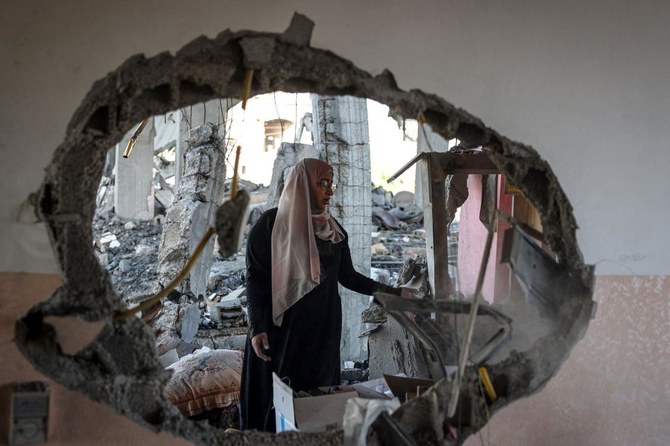
- Army tanks made a new incursion east of Beit Hanoun on the northern edge of the Gaza Strip, though they did not penetrate far into the city
- The renewed shelling and bombing of northern Gaza comes almost four months after the Israeli army announced it was drawing down its troops there
GAZA: Israel bombarded northern Gaza overnight in some of the heaviest shelling in weeks, causing panic among residents and flattening neighborhoods in an area from which the Israeli army had previously down its troops, residents said on Tuesday.
Army tanks made a new incursion east of Beit Hanoun on the northern edge of the Gaza Strip, though they did not penetrate far into the city, residents and Hamas media said. Gunfire reached some schools where displaced residents were sheltering.
In Israel, where government offices and businesses were shut to celebrate the Jewish Passover holiday, incoming rocket alerts sounded in southern border towns, although no casualties were reported.
The armed wing of Islamic Jihad, a group allied to Hamas, claimed responsibility for the rocket attacks on Sderot and Nir Am, indicating fighters were still able to launch them almost 200 days into the war, which has flattened large swathes of the enclave and displaced almost all of its 2.3 million people.
Thick black smoke could be seen rising in northern Gaza from across the southern Israeli border. Shelling was intense east of Beit Hanoun and Jabalia and continued on Tuesday morning in areas such as Zeitoun, one of Gaza City’s oldest suburbs, with residents reporting at least 10 strikes in a matter of seconds along the main road.
Just west of Beit Hanoun in Beit Lahiya, medics and Hamas media said strikes had hit a mosque and a crowd gathering on the coastal road to collect aid dropped from the air. Reuters could not immediately confirm those targets.
“It was one of those nights of horror that we had lived in at the start of the war. The bombing from tanks and planes didn’t stop,” said Um Mohammad, 53, a mother-of-six living 700 meters from Zeitoun.
“I had to gather with my children and my sisters who came to shelter with me in one place and pray for our lives as the house kept shaking,” she told Reuters via a chat app.
“I don’t know if we will make it alive before this war stops,” she added.
The Israeli army said rockets launched overnight into Israel had come from firing positions in northern Gaza. It had struck rocket launchers and killed several militants overnight, in what it called “targeted and precise” strikes.
“Over the past day, IAF fighter jets and additional aircraft struck approximately 25 terror targets throughout the Gaza Strip, including military infrastructure, observation posts, terrorists, launch posts,” it said in a statement.
Hitting areas where troops had withdrawn
The renewed shelling and bombing of northern Gaza comes almost four months after the Israeli army announced it was drawing down its troops there, saying Hamas no longer controlled those areas.
This month, Israel also drew down most of its forces in southern Gaza. But efforts to reach a ceasefire have failed, and Israeli bombardment and raids on territory where its troops have withdrawn are making it difficult for displaced Gazans to return to abandoned homes. Israel also struck Khan Younis in the south on Tuesday, a day after tanks raided eastern parts of that city.
Israel says it is seeking to eradicate Hamas, which controls the enclave, following an attack by the militant group on Oct. 7, killing 1,200 and taking 253 hostages by Israeli tallies.
Across the Gaza Strip, Israel’s military strikes killed 32 Palestinians and wounded 59 others in the past 24 hours, Palestinian health authorities said. They say more than 34,000 people have been confirmed killed in the seven-month war, with thousands more bodies as yet unrecovered.
Residents also reported bombing east of Deir Al-Balah on Tuesday in a central zone separating the north from the south.
In Nasser Hospital, southern Gaza’s main health facility, authorities recovered a further 35 bodies from what they say is one of at least three mass graves found at the site, taking the total found there to 310 in one week.
Israel says it was forced to battle inside hospitals because Hamas fighters operated there, which medical staff and Hamas deny.
Tent compound rises in Khan Younis as Israel prepares for Rafah offensive
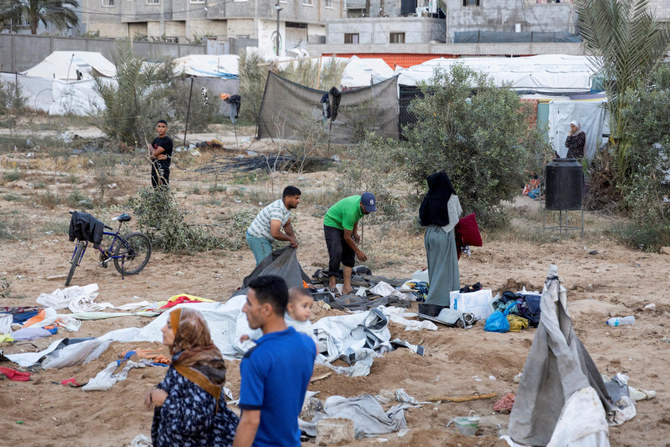
- Israel has said it plans to evacuate civilians from Rafah during an anticipated offensive on the southern city
- The Israel-Hamas war has killed more than 34,000 Palestinians
The tent construction is near Khan Younis, which has been targeted by repeated Israeli military operations over recent weeks. Israel has said it plans to evacuate civilians from Rafah during an anticipated offensive on the southern city, where hundreds of thousands of people have taken refuge during the war, now in its seventh month.
Also Monday, a failed rocket strike was launched at a base housing US-led coalition forces at Rumalyn, Syria, marking the first time since Feb. 4 that Iranian-backed militias have attacked a US facility in Iraq or Syria, a US defense official said. No personnel were injured in the attack, and no group has claimed responsibility for the attack.
The conflict has sparked regional unrest pitting Israel and the US against Iran and allied militant groups across the Middle East. Israel and Iran traded fire directly this month, raising fears of all-out war.
The war was sparked by the unprecedented Oct. 7 raid into southern Israel in which Hamas and other militants killed around 1,200 people, mostly civilians, and abducted around 250 hostages. Israel says militants are still holding around 100 hostages and the remains of more than 30 others.
The Israel-Hamas war has killed more than 34,000 Palestinians, according to local health officials, at least two-thirds of them children and women. It has devastated Gaza’s two largest cities and left a swath of destruction. Around 80 percent of the territory’s population have fled to other parts of the besieged coastal enclave.
The US House of Representatives approved a $26 billion aid package on Saturday that includes around $9 billion in humanitarian assistance for Gaza, which experts say is on the brink of famine, as well as billions for Israel. The US Senate could pass the package as soon as Tuesday, and President Joe Biden has promised to sign it immediately.



